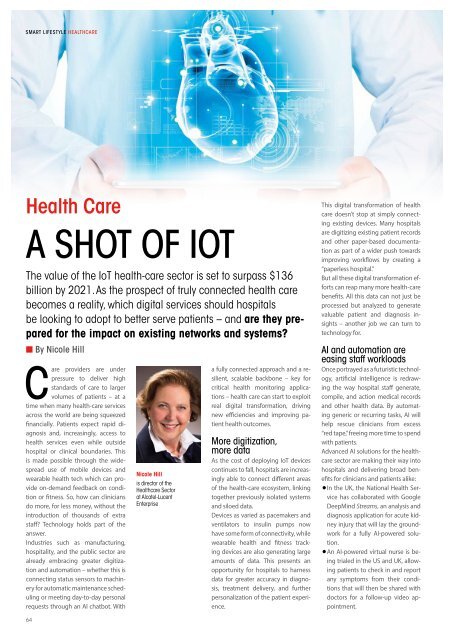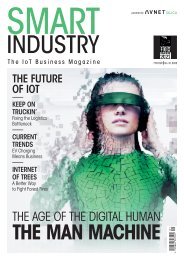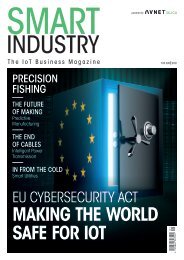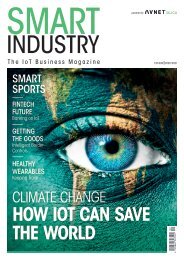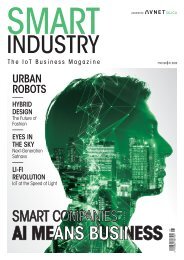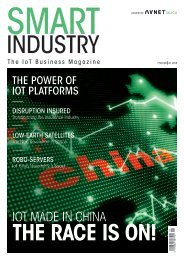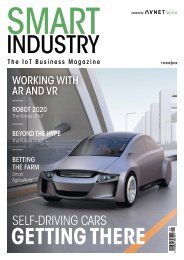Smart Industry 2/2018
Smart Industry 2/2018 - The IoT Business Magazine - powered by Avnet Silica
Smart Industry 2/2018 - The IoT Business Magazine - powered by Avnet Silica
Create successful ePaper yourself
Turn your PDF publications into a flip-book with our unique Google optimized e-Paper software.
<strong>Smart</strong> Lifestyle healthcare<br />
Health Care<br />
A Shot OF IoT<br />
The value of the IoT health-care sector is set to surpass $136<br />
billion by 2021. As the prospect of truly connected health care<br />
becomes a reality, which digital services should hospitals<br />
be looking to adopt to better serve patients – and are they prepared<br />
for the impact on existing networks and systems?<br />
n By Nicole Hill<br />
Care providers are under<br />
pressure to deliver high<br />
standards of care to larger<br />
volumes of patients – at a<br />
time when many health-care services<br />
across the world are being squeezed<br />
financially. Patients expect rapid diagnosis<br />
and, increasingly, access to<br />
health services even while outside<br />
hospital or clinical boundaries. This<br />
is made possible through the widespread<br />
use of mobile devices and<br />
wearable health tech which can provide<br />
on-demand feedback on condition<br />
or fitness. So, how can clinicians<br />
do more, for less money, without the<br />
introduction of thousands of extra<br />
staff? Technology holds part of the<br />
answer.<br />
Industries such as manufacturing,<br />
hospitality, and the public sector are<br />
already embracing greater digitization<br />
and automation – whether this is<br />
connecting status sensors to machinery<br />
for automatic maintenance scheduling<br />
or meeting day-to-day personal<br />
requests through an AI chatbot. With<br />
Nicole Hill<br />
is director of the<br />
Healthcare Sector<br />
at Alcatel-Lucent<br />
Enterprise<br />
a fully connected approach and a resilient,<br />
scalable backbone – key for<br />
critical health monitoring applications<br />
– health care can start to exploit<br />
real digital transformation, driving<br />
new efficiencies and improving patient<br />
health outcomes.<br />
More digitization,<br />
more data<br />
As the cost of deploying IoT devices<br />
continues to fall, hospitals are increasingly<br />
able to connect different areas<br />
of the health-care ecosystem, linking<br />
together previously isolated systems<br />
and siloed data.<br />
Devices as varied as pacemakers and<br />
ventilators to insulin pumps now<br />
have some form of connectivity, while<br />
wearable health and fitness tracking<br />
devices are also generating large<br />
amounts of data. This presents an<br />
opportunity for hospitals to harness<br />
data for greater accuracy in diagnosis,<br />
treatment delivery, and further<br />
personalization of the patient experience.<br />
This digital transformation of health<br />
care doesn’t stop at simply connecting<br />
existing devices. Many hospitals<br />
are digitizing existing patient records<br />
and other paper-based documentation<br />
as part of a wider push towards<br />
improving workflows by creating a<br />
“paperless hospital.”<br />
But all these digital transformation efforts<br />
can reap many more health-care<br />
benefits. All this data can not just be<br />
processed but analyzed to generate<br />
valuable patient and diagnosis insights<br />
– another job we can turn to<br />
technology for.<br />
AI and automation are<br />
easing staff workloads<br />
Once portrayed as a futuristic technology,<br />
artificial intelligence is redrawing<br />
the way hospital staff generate,<br />
compile, and action medical records<br />
and other health data. By automating<br />
generic or recurring tasks, AI will<br />
help rescue clinicians from excess<br />
“red tape,” freeing more time to spend<br />
with patients.<br />
Advanced AI solutions for the healthcare<br />
sector are making their way into<br />
hospitals and delivering broad benefits<br />
for clinicians and patients alike:<br />
• In the UK, the National Health Service<br />
has collaborated with Google<br />
DeepMind Streams, an analysis and<br />
diagnosis application for acute kidney<br />
injury that will lay the groundwork<br />
for a fully AI-powered solution.<br />
• An AI-powered virtual nurse is being<br />
trialed in the US and UK, allowing<br />
patients to check in and report<br />
any symptoms from their conditions<br />
that will then be shared with<br />
doctors for a follow-up video appointment.<br />
64


